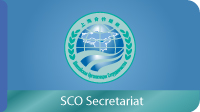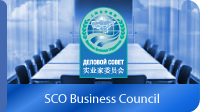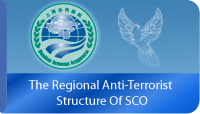|
|
 |
| Kirill Barsky: As the SCO presidency in 2014-2015 Russia will promote a broad agenda |
| 17.06.2013 12:57 |
|
|
|
|
Q: According to the recent ‘Jane’s Defense Weekly’, the Russian defense spending will increase by 40% in the next three years. President Xi Jingping’s visit to Russia has strengthened cooperation between the military forces of the two countries. Will the two countries cooperate in defense research?
A: Your question refers to bilateral cooperation between Russia and China which I am not in a position to comment on. I can only say that the Russian-Chinese relations have reached a very high level of strategic partnership, and the successful visit of President Xi Jinping to Russia last March tangibly contributed to the enhancement of collaboration in all spheres including military cooperation.
As to cooperation between defense ministries of the SCO Member-States it is part and parcel of security cooperation within the Organization. It includes annual ministerial meetings, regular consultations of senior defense officials, joint military exercises. The last one took place in 2012 in Tajikistan. Further plans of cooperation between militaries of the Member-States will be discussed at the Meeting of Ministers of Defense of the six countries to be held in late June in Bishkek, Kyrgyzstan.
Here I have to underscore one point. The SCO is not a defense alliance, and military cooperation in its framework is strictly limited to counter-terrorism.
Q: In 2014, Russia will assume the rotating presidency of the SCO. Once you said the characteristics of the serious international situation facing SCO are terrorism, separatism, drug trafficking and other forms of transnational crime. What region will SCO focus on in case of security in future?
A: As the SCO presidency in 2014-2015 Russia will promote a broad agenda. But I guess that strengthening security cooperation, maintenance of stability in the SCO region, first and foremost in Central Asia, will be among top priorities.
At the initial stage the SCO concentrated on combating most acute threats to regional security – terrorism, separatism and extremism. Regional Counter-Terrorism Structure was set up in Tashkent in 2004. Numerous important intergovernmental documents providing a legal basis for cooperation in various areas of security have been signed. Programs on Countering Terrorism, Separatism and Extremism are adopted every three years. But what is most important - all these agreements have been translated into concrete actions of law enforcement agencies of the six countries which helped to prevent hundreds of terrorist attacks and to arrest thousands of terrorists.
As time went by new challenges and threats began to emerge and to come to the forefront of the SCO security agenda. Namely they include narcotic drugs trafficking, money laundering, transnational organized crime, cyber-terrorism, cyber-crime etc. It also became evident that all security threats in our region are interconnected.
That is why Mr. Vladimir Putin, President of the Russian Federation, put forward an initiative to transform the existing SCO Regional Counter-Terrorism Structure which has proved to be an effective organ to fight terrorists into a Universal Center for Countering Threats to Security of the SCO Member-States. We view this future Center as a full-fledged security cooperation mechanism which will allow Member-States to deal with the whole range of challenges to security and stability in a more systemic and coordinated manner.
Another serious problem is the rise of radicalism and xenophobia throughout the world, and the SCO Member-States are not an exception. Our countries need to join hands in fighting extremism and preventing terrorism not only by force but also using “soft power”. This is a work in which - in addition to respective government bodies – NGOs, public associations and all layers of our societies must participate. Special role belongs to educational institutions, mass-media, church and confessional communities, youth movements, business circles etc.
Q: You have emphasized the realistic threat facing regional and international information security, could you explain it more?
A: Information security, or cyber security, is one of the most serious challenges facing the international community, individual countries and corporate sector. The SCO Member-States were among the first to pay attention to this issue.
In 2006 a special SCO Expert Group on Information Security was set up. It came to a conclusion that the world needs a comprehensive approach to this issue based on the assumption that threats to global and national cyber security include not only terrorist threats and criminal threats, but also a danger of military use of ICT as a “Three-in-One Concept”.
Stemming from this approach experts worked out an intergovernmental SCO Agreement on cooperation in the sphere of international information security. It defined information threats and outlined principles, areas, forms and mechanisms of cooperation, including modalities of how the States-Parties should coordinate actions and provide mutual assistance in countering information security threats. By the way the Agreement is open to accession of any country, not limiting its scope only to the SCO Member-States.
Now that the above Agreement entered into force experts of the SCO countries embarked on a concrete work to implement it in all aspects. The recent meeting of the Expert Group was convened last May in Beijing and achieved commendable results. But a lot still remains to be done to protect SCO Member-States from various cyber threats.
Q: BRICS drafted resolution ‘Strengthening international cooperation to combat cybercrime’, requesting to further research on cybercrime. What measures will Russia take on boosting the ties among members in response to challenge?
A: The problem of cyber security raises serious concern of the whole world. It is being widely discussed by different international organizations. Both BRICS and SCO are working on it, and positions of these two groupings are very close. However there are countries and organizations which have a different view.
In order to elaborate a unified approach to this complex matter the UN General Assembly decided to establish a Government Expert Group. It will meet in August in New York for its first session.
The SCO has already shared its vision with other UN members as our input to the forthcoming meeting. In April 2011 the six SCO Member-States drafted a voluntary “Code of Conduct of States in the Sphere of international information security”. Its purpose was to identify rights and responsibilities of states in the information space, to facilitate their commitment to constructive and responsible behavior, stimulate their cooperation in addressing common threats and challenges and at the same time to reconfirm adherence to human rights and fundamental freedoms. All states are invited to make a political commitment to cooperate in combating criminal or terrorist activity using ICT; to respect rights and freedoms of citizens in the information space; not to use ICT to carry out hostile activities or acts of aggression; not to proliferate information weapons and related technologies; to cooperate in combating criminal and terrorist activities which use ICT; to curb dissemination of information which incites terrorism and extremism or undermines social stability and cultural values of other states; to reaffirm the rights and responsibilities of all states to protect their information space and critical information infrastructure; to promote a multilateral, transparent and democratic international management of the Internet; to boost bilateral, regional and international cooperation.
The SCO Member-States’ envoys to the UN requested the United Nations Secretary General to circulate the “Code of Conduct” as an official document of the 66th session of the UN General Assembly. We believe that a later stage it can be upgraded into a GA resolution or even into a legally binding Convention on information security which would include sections on military use of information technology, combating terrorism and crime in the information sphere. The urgency of adoption of a universal document on this set of issues is growing.
Q: You said the second pivot of SCO is economic cooperation. The current slowing global economy influences Russian foreign trade. How will Russia cooperate with SCO to meet the challenge threatening the Asian economic development?
A: The main priority of the SCO has been and will continue to be joint efforts of its Member-States to safeguard regional security and stability, in particular to combat terrorism, separatism and extremism. At the same time economic cooperation is also one of its important pillars. Alongside with cultural and humanitarian cooperation, economic cooperation is enshrined in the SCO Charter as a direction of collaboration. This is no surprise because the SCO was established as a comprehensive regional organization.
From the economic point of view the SCO has a huge potential. Resources and advantages of Russia, China, Kazakhstan, Kyrgyzstan, Tajikistan and Uzbekistan as well as of five Observer-States and three dialogue partners should be combined for the benefit of closer regional cooperation. The most promising areas of cooperation are transport, energy, infrastructure, science and technology, especially ICT, agriculture etc.
The SCO has already developed detailed plans of economic cooperation focusing on implementation of concrete multilateral projects in the format of interested countries or their state or private companies. We call this flexible formula a “Two Plus X” model. A growing number of such projects are being initiated by the SCO Business Council, SCO Banking Association and SCO Youth Council.
The SCO does not need to become an integration organization since the Eurasian regional integration process is already in full swing with the Russia- Kazakhstan-Belarus Customs’ Union as the core entity. But the SCO may effectively cooperate with other regional organizations in the field of economy thus contributing to sustainable growth of its Member-States and economic cooperation in the region.
Q: Once you said that SCO faced three main responsibilities: anti-terrorism, economic and humanitarian cooperation, while the last one plays a more and more important part. Which cultural areas will SCO members boost cooperation and development in?
A: In the modern world social networking plays an extremely important role. For a regional organization a strong public support, protracted ties between NGOs, wide contacts between rank-and-file people have growing significance. We must bring people of the six friendly nations together.
Today the SCO Member-States focus on promoting cooperation in the fields of culture, education, health care, emergency response and youth policy. In some areas good projects are being successfully implemented, for example the SCO Network University. In others cooperation projects are already in the pipeline. Recently new interesting initiatives have been aired, among them an idea to kick-start an inter-civilizational dialogue which can involve research centers, religious and cultural organizations and mass-media of the SCO Member-States and Observer-States which represent the majority of the world civilizations. Multilateral cooperation in the sphere of tourism is another area where relevant tourist companies and associations can work together facilitating people-to-people contacts.
As a strategic goal we must strive for creating a common SCO cultural, educational, health and intellectual space. This will bring us closer to the realization of an idea of an SCO Community in the future.
Q: In 2009, you worked on arranging files of the development history of Russian diplomatic service. A Chinese saying goes, ‘take history as mirror. ’ What do you benefit from the job? What’s your main tasks in future ties between China and Russia?
A: I started collecting materials on the history of the Russian/Soviet Embassy in China in 2009 and the work is going on. I think it is extremely important for a diplomatic service of any country not to forget its predecessors, their names, careers and achievements. This way not only can we commemorate previous generations of diplomats but also to educate diplomats of the young generation in the right spirit. To this end my colleagues and I are taking efforts to streamline data contained in the Foreign Ministry archives, books on the history of Russian-Chinese and Soviet-Chinese relations and memoirs of our famous China experts. Our aim is to compile detailed written records of the Embassy and its personnel throughout the history since the establishment of the Embassy of the Russian Empire in Beijing in 1860. In order to obtain first-hand information on who was who in the Embassy, how our diplomats worked and lived, what kind of people they were we are interviewing veterans of the Russian diplomatic service. This work has received full support of the top officials of our Ministry.
The first article we plan to publish in the coming months will be devoted to the establishment of diplomatic relations between the USSR and the Republic of China in 1924 and the day-to day work of the Soviet Embassy in China. Outstanding people were posted in Beijing at that time, and they did a great job to push ahead friendship and cooperation between our countries. It is going to be a very exciting story.
In China many books on diplomatic history have been written in recent years. I believe that some episodes of the diplomatic relations between the USSR and the P.R.C. deserve further researching and publicizing. For example, it will be interesting for readers to know more about first steps of the P.R.C. Embassy in Moscow after it was opened in 1949. At that time the Soviet Government rendered massive assistance to the Chinese diplomatic mission. Premises, cars, furniture and equipment were provided for free. The Soviet Foreign Ministry even organized special courses for the Chinese Embassy staffers who lacked diplomatic knowledge and practical experience in diplomacy. Young people in our countries should know these facts.
|
|
* Реестр иностранных средств массовой информации, выполняющих функции иностранного агента:
Голос Америки, Idel.Реалии, Кавказ.Реалии, Крым.Реалии, Телеканал Настоящее Время, Azatliq Radiosi, PCE/PC, Сибирь.Реалии, Фактограф, Север.Реалии, Радио Свобода, MEDIUM-ORIENT, Пономарев Лев Александрович, Савицкая Людмила Алексеевна, Маркелов Сергей Евгеньевич, Камалягин Денис Николаевич, Апахончич Дарья Александровна, Medusa Project, Первое антикоррупционное СМИ, VTimes.io, Баданин Роман Сергеевич, Гликин Максим Александрович, Маняхин Петр Борисович, Ярош Юлия Петровна, Чуракова Ольга Владимировна, Железнова Мария Михайловна, Лукьянова Юлия Сергеевна, Маетная Елизавета Витальевна, The Insider SIA, Рубин Михаил Аркадьевич, Гройсман Софья Романовна, Рождественский Илья Дмитриевич, Апухтина Юлия Владимировна, Постернак Алексей Евгеньевич, Общество с ограниченной ответственностью Телеканал Дождь, Петров Степан Юрьевич, Istories fonds, Шмагун Олеся Валентиновна, Мароховская Алеся Алексеевна, Долинина Ирина Николаевна, Шлейнов Роман Юрьевич, Анин Роман Александрович, Великовский Дмитрий Александрович, Альтаир 2021, Ромашки монолит, Главный редактор 2021, Вега 2021
* Сведения реестра НКО, выполняющих функции иностранного агента:
Фонд защиты прав граждан Штаб, Институт права и публичной политики, Лаборатория социальных наук, Фонд по борьбе с коррупцией, Альянс врачей, НАСИЛИЮ.НЕТ, Мы против СПИДа, Фонд защиты прав граждан, СВЕЧА, Гуманитарное действие, Открытый Петербург, Феникс ПЛЮС, Лига Избирателей, Правовая инициатива, Гражданская инициатива против экологической преступности, Фонд борьбы с коррупцией, Гражданский Союз, Российский Красный Крест, Центр Хасдей Ерушалаим, Центр поддержки и содействия развитию средств массовой информации, Горячая Линия, В защиту прав заключенных, Институт глобализации и социальных движений, Центр социально-информационных инициатив Действие, ВМЕСТЕ, Благотворительный фонд охраны здоровья и защиты прав граждан, Благотворительный фонд помощи осужденным и их семьям, Фонд Тольятти, Новое время, Серебряная тайга, Так-Так-Так, центр Сова, центр Анна, Проект Апрель, Самарская губерния, Эра здоровья, правозащитное общество Мемориал, Аналитический Центр Юрия Левады, Издательство Парк Гагарина, Фонд имени Андрея Рылькова, Сфера, Центр защиты СИБАЛЬТ, Уральская правозащитная группа, Женщины Евразии, Рязанский Мемориал, Екатеринбургское общество МЕМОРИАЛ, Институт прав человека, Фонд защиты гласности, Российский исследовательский центр по правам человека, Дальневосточный центр развития гражданских инициатив и социального партнерства, Пермский региональный правозащитный центр, Гражданское действие, Центр независимых социологических исследований, Сутяжник, АКАДЕМИЯ ПО ПРАВАМ ЧЕЛОВЕКА, Частное учреждение Совета Министров северных стран, Центр развития некоммерческих организаций, Гражданское содействие, Центр Трансперенси Интернешнл-Р, Центр Защиты Прав Средств Массовой Информации, Институт развития прессы - Сибирь, Фонд поддержки свободы прессы, Гражданский контроль, Человек и Закон, Общественная комиссия по сохранению наследия академика Сахарова, Информационное агентство МЕМО. РУ, Институт региональной прессы, Институт Развития Свободы Информации, Экозащита!-Женсовет, Общественный вердикт, Евразийская антимонопольная ассоциация, Чанышева Лилия Айратовна, Сидорович Ольга Борисовна, Таранова Юлия Николаевна, Туровский Александр Алексеевич, Васильева Анастасия Евгеньевна, Ривина Анна Валерьевна, Бурдина Юлия Владимировна, Бойко Анатолий Николаевич, Гусева Ольга Андреевна, Дугин Сергей Георгиевич, Пивоваров Андрей Сергеевич, Писемский Евгений Александрович, Аверин Виталий Евгеньевич, Барахоев Магомед Бекханович, Шевченко Дмитрий Александрович, Жданов Иван Юрьевич, Рубанов Роман Викторович, Шарипков Олег Викторович, Мальсагов Муса Асланович, Мошель Ирина Ароновна, Шведов Григорий Сергеевич, Пономарев Лев Александрович, Каргалицкий Борис Юльевич, Созаев Валерий Валерьевич, Исакова Ирина Александровна, Исламов Тимур Рифгатович, Романова Ольга Евгеньевна, Щаров Сергей Алексадрович, Цирульников Борис Альбертович, Халидова Марина Владимировна, Людевиг Марина Зариевна, Федотова Галина Анатольевна, Паутов Юрий Анатольевич, Верховский Александр Маркович, Пислакова-Паркер Марина Петровна, Кочеткова Татьяна Владимировна, Чуркина Наталья Валерьевна, Акимова Татьяна Николаевна, Золотарева Екатерина Александровна, Рачинский Ян Збигневич, Жемкова Елена Борисовна, Гудков Лев Дмитриевич, Илларионова Юлия Юрьевна, Саранг Анна Васильевна, Захарова Светлана Сергеевна, Аверин Владимир Анатольевич, Щур Татьяна Михайловна, Щур Николай Алексеевич, Блинушов Андрей Юрьевич, Мосин Алексей Геннадьевич, Гефтер Валентин Михайлович, Симонов Алексей Кириллович, Флиге Ирина Анатольевна, Мельникова Валентина Дмитриевна, Вититинова Елена Владимировна, Баженова Светлана Куприяновна, Исаев Сергей Владимирович, Максимов Сергей Владимирович, Беляев Сергей Иванович, Голубева Елена Николаевна, Ганнушкина Светлана Алексеевна, Закс Елена Владимировна, Буртина Елена Юрьевна, Гендель Людмила Залмановна, Кокорина Екатерина Алексеевна, Шуманов Илья Вячеславович, Арапова Галина Юрьевна, Пастухова Анна Яковлевна, Прохоров Вадим Юрьевич, Шахова Елена Владимировна, Подузов Сергей Васильевич, Протасова Ирина Вячеславовна, Литинский Леонид Борисович, Лукашевский Сергей Маркович, Бахмин Вячеслав Иванович, Шабад Анатолий Ефимович, Сухих Дарья Николаевна, Орлов Олег Петрович, Добровольская Анна Дмитриевна, Королева Александра Евгеньевна, Смирнов Владимир Александрович, Вицин Сергей Ефимович, Золотухин Борис Андреевич, Левинсон Лев Семенович, Локшина Татьяна Иосифовна, Орлов Олег Петрович, Полякова Мара Федоровна, Резник Генри Маркович, Захаров Герман Константинович
* Единый федеральный список организаций, в том числе иностранных и международных организаций, признанных в соответствии с законодательством Российской Федерации террористическими:
Высший военный Маджлисуль Шура, Конгресс народов Ичкерии и Дагестана, Аль-Каида, Асбат аль-Ансар, Священная война, Исламская группа, Братья-мусульмане, Партия исламского освобождения, Лашкар-И-Тайба, Исламская группа, Движение Талибан, Исламская партия Туркестана, Общество социальных реформ, Общество возрождения исламского наследия, Дом двух святых, Джунд аш-Шам, Исламский джихад, Аль-Каида, Имарат Кавказ, АБТО, Правый сектор, Исламское государство, Джабха аль-Нусра ли-Ахль аш-Шам, Народное ополчение имени К. Минина и Д. Пожарского, Аджр от Аллаха Субхану уа Тагьаля SHAM, АУМ Синрике, Муджахеды джамаата Ат-Тавхида Валь-Джихад, Чистопольский Джамаат, Рохнамо ба суи давлати исломи, Террористическое сообщество Сеть, Катиба Таухид валь-Джихад, Хайят Тахрир аш-Шам, Ахлю Сунна Валь Джамаа
* Перечень общественных объединений и религиозных организаций в отношении которых судом принято вступившее в законную силу решение о ликвидации или запрете деятельности:
Национал-большевистская партия, ВЕК РА, Рада земли Кубанской Духовно Родовой Державы Русь, Асгардская Славянская Община Асгардской Веси Беловодья, Славянская Община Капища Веды Перуна, Мужская Духовная Семинария Староверов-Инглингов, Нурджулар, К Богодержавию, Таблиги Джамаат, Русское национальное единство, Национал-социалистическое общество, Джамаат мувахидов, Объединенный Вилайат Кабарды, Балкарии и Карачая, Союз славян, Ат-Такфир Валь-Хиджра, Пит Буль, Национал-социалистическая рабочая партия России, Славянский союз, Формат-18, Благородный Орден Дьявола, Армия воли народа, Национальная Социалистическая Инициатива города Череповца, Духовно-Родовая Держава Русь, Русское национальное единство, Древнерусской Инглистической церкви Православных Староверов-Инглингов, Русский общенациональный союз, Движение против нелегальной иммиграции, Кровь и Честь, О свободе совести и о религиозных объединениях, Омская организация Русское национальное единство, Северное Братство, Клуб Болельщиков Футбольного Клуба Динамо, Файзрахманисты, Мусульманская религиозная организация п. Боровский, Община Коренного Русского народа Щелковского района, Правый сектор, Украинская национальная ассамблея, Украинская повстанческая армия, Тризуб им. Степана Бандеры, Украинская организация «Братство», Свидетели Иеговы, О противодействии экстремистской деятельности, РЕВТАТПОД, Артподготовка, Штольц, В честь иконы Божией Матери Державная, Сектор 16, Независимость, Организация футбольных болельщиков «Фирма», Молодежная правозащитная группа МПГ, Курсом Правды и Единения, Каракольская инициативная группа, Автоград Крю, Союз Славянских Сил Руси, Алля-Аят, Благотворительный пансионат Ак Умут, Русская республика Русь, Арестантское уголовное единство, Башкорт, Нация и свобода, W.H.С., Фалунь Дафа, Иртыш Ultras, Русский Патриотический клуб-Новокузнецк/РПК, Сибирский державный союз, Фонд борьбы с коррупцией, Фонд защиты прав граждан, Штабы Навального
|






















Leave a comment